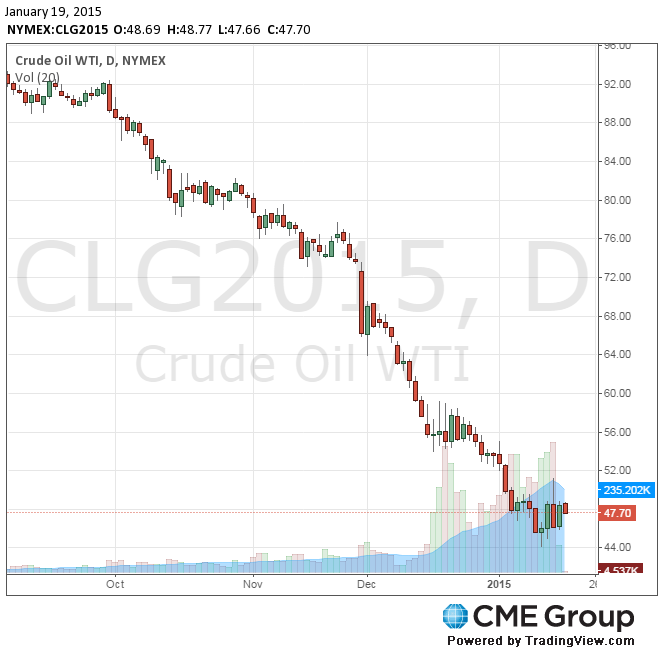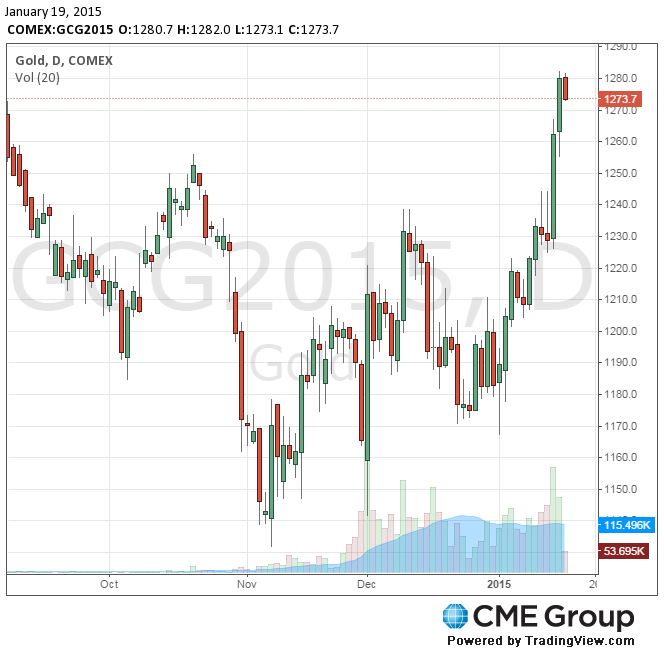Noticias del mercado
-
17:40
Oil declined from a one-week high
Oil declined from a one-week high in London and New York as Iraqi production advanced to a record, compounding a global supply surplus.
Prices slid as much as 2.1 percent in New York and 1.9 percent in London after their first weekly gain in two months. Iraq is pumping at an unprecedented pace of 4 million barrels a day, Oil Minister Adel Abdul Mahdi said. Oil extended losses after Chinese shares plunged the most since 2008 as regulators cracked down on margin lending.
Crude slumped almost 50 percent last year as the U.S. pumped oil at the fastest rate in more than three decades while the Organization of Petroleum Exporting Countries resisted calls to cut supply. Iraq's oil production rose to a 35-year high in December and could break more records in the coming months, according to the International Energy Agency.
"With supply exceeding demand it still seems highly likely that the market will fall further," Christopher Bellew, senior broker at Jefferies International Ltd. in London, said by e-mail. "Rallies above $50 have proved very short-lived and my expectation is for the price to move in a sideways range until the next move to the downside, which I expect to take the price to $40 or lower."
Brent for March settlement slid as much as 95 cents to $49.22 a barrel on the London-based ICE Futures Europe exchange. It gained 3.9 percent to $50.17 on Jan. 16, the highest settlement since Jan. 8. It was at $49.45 at 2:20 p.m. London time. The European benchmark crude was at a premium of $1.18 to WTI for the same month.
West Texas Intermediate for February delivery, which expires on Jan. 20, dropped as much as $1.03 to $47.66 a barrel on the New York Mercantile Exchange. The more active March future fell 85 cents to $48.28. The volume of all futures traded was 32 percent below the 100-day average for the time of day. Prices rose 0.7 percent last week.

-
17:20
Gold is trading near 4-month high
Gold prices held near a four-month high due to the instability in world markets, increases the demand for low-risk assets.
Stocks of the world's largest gold ETF-secured fund SPDR Gold Trust on Friday rose 1.92 percent to 730.89 tons, which was the maximum daily increase since May 2010.
"Volatility in the European currency markets stimulates demand for gold as a safe asset," - said an analyst at ANZ Victor Tyanpiriya.
Euro against the dollar held near 11-year low, as analysts almost certain that at a meeting on Thursday, the ECB announced the commencement of purchase of government bonds. Traders are waiting for data on China's GDP in the fourth quarter and the outcome of the meeting of the Bank of Japan.
Last Thursday, the Swiss National Bank shocked markets abandonment of the exchange rate of 1.20 francs per euro, making it clear that he expects that during the upcoming meeting on Thursday the ECB will resort to quantitative easing.
This decision came as a surprise to the financial markets, with the result that the Swiss franc has appreciated in all directions.
Index USD, which measures the strength of the US dollar against a basket of six major currencies, fell 0.35% to 92.72.
The cost of the February gold futures on the COMEX today fell to 1273.10 dollars per ounce.

-
12:20
Oil: Prices decline from a one-week high
Brent crude and West Texas Intermediate could not extend last week's gains. On Friday Oil prices rose more than $ 1, departing multi-year lows, which was due to new forecasts from the International Energy Agency. Today, in its monthly report the IEA said that this year the prices may recover. The agency downgraded the outlook for production from countries outside OPEC. "Where will the market bottom is anyone's guess. But the sale does not go unnoticed - said IEA. Brent Crude lost -0.68%, currently trading at USD49.83 a barrel. West Texas Intermediate declined by -1.01% currently quoted at USD48.20 as Iraq further boosts production to 4 million barrels a day adding to the global glut. Slumping Chinese stocks put further pressure on oil prices.
Oil prices fell by nearly 60 percent over the past six months, and both the key brand of oil is currently trading below $ 50 a barrel as the supply of high quality light crude oil from the United States and Canada exceeded demand in a period of low global economic growth.
Today trading volumes are expected to be low as U.S. markets are closed due to a bank holiday.
-
12:00
Gold near four-month high before ECB policy meeting
Gold prices declined today from a new four-month high hit on Friday before ECB policy makers meet on January 22nd to decide on future stimulus measures. On Friday Gold prices rose sharply, reaching a four-month high, and went to his largest weekly gain in the last 17 months (+ 4.5%). According to Bloomberg holdings in the largest exchange traded product increased the most since 2010 as gold benefits from political uncertainty being a haven investment. Markets also await the outcome of the elections in Greece scheduled for January 25th. Recently gold-prices were boosted by the surprise move of the SNB. The SNB decided to discontinue the minimum exchange rate of 1.20 per euro and lowered interest rates more into negative territory to -0.75. The precious metal became more expensive in recent day's despite the significant strengthening of the US dollar, which usually causes a backlash.
The precious metal is currently quoted at USD1,276.50, -0,20% a troy ounce.
-
01:02
Commodities. Daily history for Jan 16’2015:
(raw materials / closing price /% change)
Light Crude 48.69 +5.28%
Gold 1,276.90 +0.96%
-
